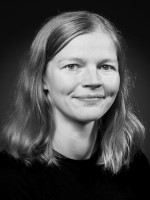Due to copyright issues, an electronic copy of the thesis must be ordered from the faculty. For the faculty to have time to process the order, the order must be received by the faculty at the latest 2 days before the public defence. Orders received later than 2 days before the defence will not be processed. After the public defence, please address any inquiries regarding the thesis to the candidate.
Trial Lecture – time and place
See Trial Lecture.
Adjudication committee
- First opponent: Professor Karen Willard-Gallo, Université Libre de Bruxelles, Belgium
- Second opponent: Professor Tom Dønnem, UiT - Arctic University of Norway,
- Third member and chair of the evaluation committee: Professor Marit Inngjerdingen, University of Oslo
Chair of the Defence
Associate Professor Andreas Lossius, University of Oslo
Principal Supervisor
Researcher Alexandre Corthay, Oslo University Hospital and University of Oslo
Summary
Immunotherapy, which is based upon utilizing the patient’s own immune system to fight cancer, has revolutionized cancer treatment. However, the response rate to current immunotherapies in advanced non-small cell lung cancer (NSCLC) is only around 20% and it is unclear why some patients respond while others do not. Thus, there is a need for better tools to monitor the anti-cancer immune response before and during immunotherapy. The main aim of this PhD thesis was to establish a method for quantitative and qualitative analysis of immune cells in NSCLC tumors to determine the state of the antitumor immune response in individual patients.
First, we critically evaluated several molecules to detect macrophages, a common type of immune cells in NSCLC tumors. We confirmed that the CD68 molecule represents a useful macrophage marker, and we found that combined immunostaining of CD68 and CD163 was useful to identify most macrophages in lung tumors.
Another frequent immune cell in NSCLC tumors is the T helper (Th) cell. Notably, some subtypes of Th cells such as Th1 are beneficial against cancer while others (Th2 and Treg) are detrimental. We established a four-color immunohistochemical assay for detection of Th subsets in tumor sections. We found that two Th subsets, the Th2 and Treg, were predominant. These findings suggest that reprogramming the type of immune response from a detrimental Th2 to a beneficial Th1 may be critical to increase the immunotherapy response rate in NSCLC.
Finally, we established a series of multiplex chromogenic immunohistochemical panels to stain most immune cell types in lung tumors. An open-source, deep-learning based algorithm was developed to analyze immune cells and tumor regions in gigabyte-sized images of stained tumor sections.
In conclusion, we have developed approaches for quantitative and qualitative measurements of various types of immune cells in NSCLC tumors, which should help develop novel prognostic and predictive tools for cancer.
Additional information
Contact the research support staff.
